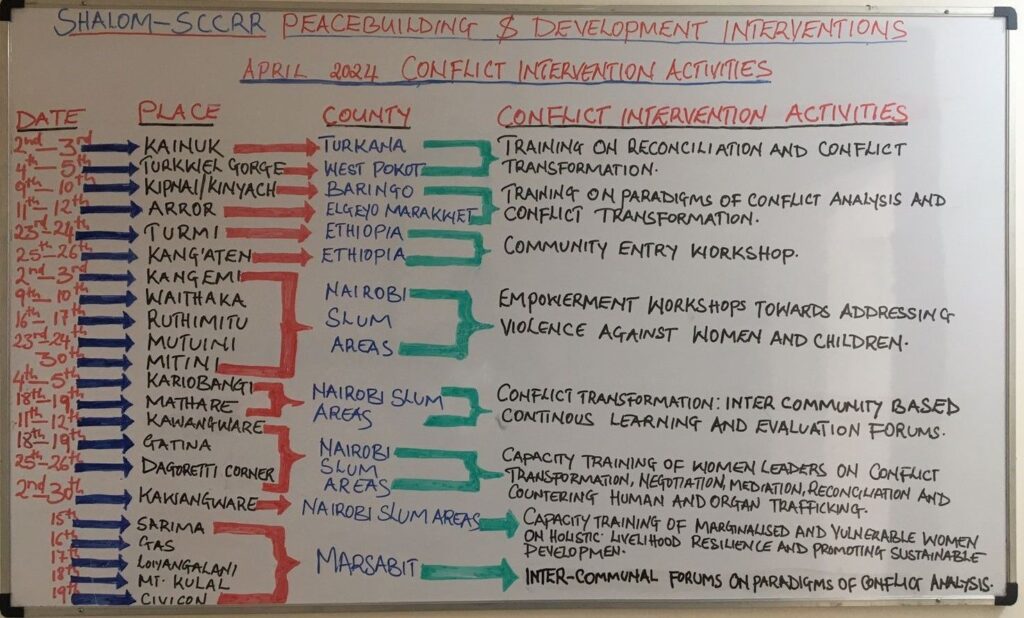By Zachaeus Adet

Zachaeus Adet
Having undergone an extensive and inspiring elective course in Tangaza University College through the lectures given by Fr. Patrick Devine, SMA, it is my humble and deep heartfelt gratitude to the work being done by the Shalom Center for Conflict Resolution and Reconciliation.
We all have the capability of living in a society where justice and peace are holistically integrated, and in this case promoting peace. The reality makes it explicit that a great percentage of our lives are in the state of negative peace where there is absence of violence. On the contrary, our aim at all levels should be focused on an environment where all of us are mutually interested in the well being and harmony of each other. I am convinced that a family, group, community, and nation that claims to be living peacefully throughout the month or year or decade or century is saying so but only in deception. The question that we need to ask is; what is my response to issues of conflict and how can we bring about reconciliation and transformation either at personal, relational, structural or cultural levels?
We need to be ready to acknowledge the past, reframe the present and envision the future which is a conflict free future of mutual interdependence, and where we can live non-violently with radical differences. In so doing, we promote peace and reconciliation. Shalom is trying all the best possible means to ensure this is accomplished by providing the necessary analytical skills for transformation in our society today so that we can actual our potential and meet our basic human needs. The measuring rod for transformation is the respect for human life which contributes to peace-building mechanisms and thus bridging the gap between our potential and actual realizations. Failure to bridge this gap and not actualizing our full potentials provides the centre piece of frustration, aggression and violence. We must note there are fundamental universal values that must be met if societies are to be stable. As a response to this challenge, there is an invitation to all of us to always go to the root causes of conflict instead of dealing with the symptoms only.
There are many channels that can heal conflict. It starts with each and every individual and the negotiations aimed at maximizing mutual benefit and considering the integrative bargaining whereby each side’s interest can be satisfied without hurting the opportunity for the other side to achieve their goals. Our political and religious leaders are at a position of fueling conflict and at the same time healing conflict. Tolerance, accommodation, respect and dialogue are some of the core elements that we need to put into action if we really need to promote and live positive peace.
From the explanations and discussions we had been having based on conflict resolution, it has come out clearly that what we think about causes conflict determines what we think we can do about it. This is in line with the conflict paradigms that we need to put into consideration whenever we are faced with a conflict. The tenets of paradigm in conflict are mainly three. First, there is the strategist approach which focuses on the power maximizing behavior so that those in power can attain security and interest. They do through manipulative persuasions, threats, sanctions and violence. Secondly, the structural or peace-research approach emphasizes the need to promote values like justice, humanity and empathy- so that people can meet their basic needs and actualize their potentials. The third paradigm is the conflict research which stresses that the imperative war does not arise from the nature of state, but from the way the environment acts on the individual by pointing out that conflict is contingent of being nurtured. It is in the third approach whereby we can realize that there is enough for everybody’s need if the environment is manipulated positively, but there is not enough for everybody’s greed.
Through the work of Shalom in providing peace building techniques and analytical skills, it is my hope that we can work together towards our transformation and actualizing our potentials thus living in peace.

